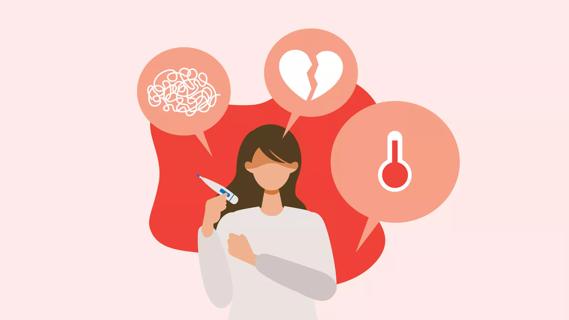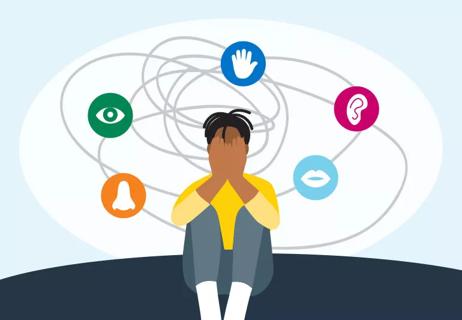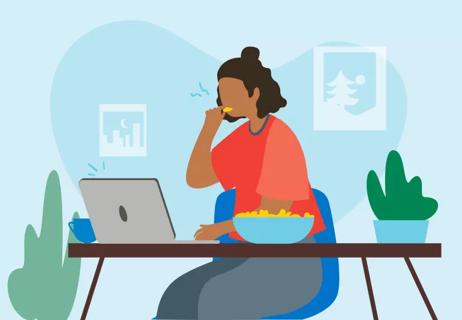Advertisement
An expert weighs in on navigating the ups and downs of mental health and COVID

The COVID-19 pandemic is a constant whirlwind of evolving information, flattened curves and worrying spikes, mask policies and virus variants. It’s been an exhausting year and a half and, despite the safety and availability of vaccines, the pandemic continues with no end in sight.
Advertisement
Cleveland Clinic is a non-profit academic medical center. Advertising on our site helps support our mission. We do not endorse non-Cleveland Clinic products or services. Policy
Chances are, a long-term fight against COVID-19 — and, consequently, long-term social distancing guidelines — wasn’t necessarily what you anticipated. You’re likely tired and even feeling a little queasy from the topsy-turvy emotional roller coaster we’ve all been riding since early 2020.
The good news, however, is there are ways to manage your mental health, your physical health and coronavirus stress. Psychologist Susan Albers, PsyD, shares how to prepare yourself mentally and physically for the ongoing up and downs of the coronavirus pandemic.
If you’ve felt more worried or glum since the pandemic started, you’re not alone. A Centers for Disease Control and Prevention (CDC) study conducted between August 2020 and February 2021 found a 5.1% increase in adults identifying symptoms of an anxiety or a depressive disorder in the previous week — equal to a rise from 36.4% to 41.5%.
“The ongoing nature of the pandemic has been really taxing,” says Dr. Albers. “For people predisposed to depression or anxiety, the pandemic has exacerbated their symptoms. At this point, people may be seeing the residual effects.”
Acknowledging these effects is vital, since our bodies — and minds — aren’t really made to handle something like long-term pandemic stress.
Advertisement
“Usually if you have a stressor, it probably means you’re stressed out for the day or, at most, maybe a week,” says Dr. Albers. “But prolonged periods of stress for months and months, it’s just not how we’re wired.”
Dr. Albers likens this daily stress to be like a constant drip of cortisol, the stress hormone, onto your brain. “Think of it to be like a cup filling up,” she says. “If it gets too high to the top, then it can overflow and impact your health in a lot of ways. But if you find ways to manage that stress, it’s like emptying the cup a little bit at a time before it spills over.”
That’s important since chronic stress takes its toll, according to Dr. Albers: “Typically, when we see somebody who has an intense amount of stress for months and months, you start to see it wear down their body and they become ill or tired or fatigued.”
Although vaccination rates continue to increase (as of August 20, 62% of Americans age 18 and up are fully vaccinated), the pandemic’s end date is unknown. Such uncertainty — as well as a feeling that we’re going backward because case numbers keep increasing — can induce dread.
“If you’re feeling dread or anxiety, that’s pretty normal,” says Dr. Albers. “It’s understandable that we would not want to take a step back to where we have been in the past.”
However, she stresses you shouldn’t panic. “It’s easy to catastrophize what is happening right now. And it’s a familiar feeling of fear and anxiety — familiar from last year. But when we catastrophize, we worry about things that are in the future. So reel back your mind, and don’t jump from A to Z or imagine the worst-case scenario. Stay in the moment and focus on the here and now.”
Dr. Albers points out this year is different from last year in significant ways. You’re better equipped mentally to handle changing restrictions and regulations, for starters, and have more physical ways to protect yourself from coronavirus.
“There are many things that are in our control,” she says. “One is to get the vaccine, but you can also continue all of the safety protocols that you know offer protection. If you need to wear a mask or wash your hands, these are all things you can do.”
In any stress-inducing situation — but especially now, amidst the ongoing pandemic — talk about how you’re feeling with friends, family and your therapist. “Do your own self-check or self-assessment of your mental health,” says Dr. Albers. Using this check-in as a starting point, you can formulate a plan to mitigate your pandemic stress.
Advertisement
Getting out and about is a good way to burn off stress and get some other benefits, too. “The vitamin D is really helpful for boosting your mood and immune system while also reducing stress hormones, too,” Dr. Albers says.
Even during fall and winter, it can be as easy as going for a nature walk, hanging out by a fire pit or running and exercising — just be sure to bundle up as necessary and practice proper social distancing guidelines. And if it is too cold outside, exercising indoors with at-home workouts is a great alternative.
Monitor and limit your own exposure to news about the pandemic, both in terms of how much time you spend on it — look out for doomscrolling! — and from where you get information.
“Be really aware of the time of day you’re tracking the news,” Dr. Albers says. Avoid first thing in the morning or late at night just before bed — and, if you’re in a less-than-ideal mood, wait for the right moment to catch up.
“Wait for when you’re in a good emotional space,” she adds. “You can flip through to find what kind of news you need. Just be mindful about what you consume.”
It might seem counterintuitive, but Dr. Albers also suggests reflecting on good things that have happened, whether that’s more quality time with family, more time outdoors or new hobbies you’ve picked up.
Advertisement
“It’s really important to focus on the positives, the opportunities that have happened. Maybe that’s new-found flexibility in working from home,” she says. “People were more present with their kids or family. Looking at the bigger picture is really important.”
In times of stress, people sometimes turn to things that help them cope at the moment but can actually make things worse. “Turning to things like drugs, alcohol and emotional eating might provide temporary relief but they really just compound the problems,” Dr. Albers says.
And be careful about pandemic stress sleep deprivation. “When we’re feeling sleep-deprived,” she says, “things can feel way too taxing.” By focusing on things like getting enough sleep, it can help put you in a better emotional space to combat stress.
“Getting that extra 30 minutes of sleep or staying away from things that may make your sleep worse in the long run can go a long way toward helping you deal with the emotional ups and downs,” she adds.
Mindfulness has been a popular topic when it comes to self-care during the pandemic and with good reason: It can help you stay focused, calm and in the moment. Dr. Albers agrees, stressing the need to stay rooted in the present.
Advertisement
“Using mindfulness and trying to control the present is important,” she says. “We can’t control what’s going to happen in the next month or several months down the line, but really focusing your mindset on today — what can I do today? — can help people from not feeling so overwhelmed.”
That extends to the daily routine of how you stay safe during the pandemic, too. “If you tell yourself, ‘I have to wear my mask for the next year,’ that can really get to you,” Dr. Albers says. “If you tell yourself, ‘I can do it for today,’ that can help.”
Your mindset, she says, doesn’t have to be all-or-nothing. It can be more focused on minimizing the risks that are around you. “There are going to be ups and downs,” she adds, “but if you can hold on through that dip, you can get to the other side of it.”
“Many people feel like they’re sort of holding their breath and waiting for it to be over,” she says. “But you’ve got to keep going and enjoy the moments that are happening now instead of putting everything on hold until this is over because it could be a while. We need to do our best to keep living, enjoy every day and find the things that do make you happy every day.”
Finally, one of the most important things in ongoing periods of uncertainty is to keep an eye out for depression, which can sometimes be caused by caution fatigue.
“If you or someone you love experiences this, or if you feel like you’re just so down about it or in a very negative space, it’s helpful to consult a professional because chronic stress can turn into depression,” says Dr. Albers.
Changes to routines, whether it’s a new work or childcare situation, compound the stress we experience. “We’re creatures of habit and routine,” Dr. Albers says. “When something throws us a curveball, many of us feel like that’s an added piece of stress because we resist change.”
She continues, “This pandemic has been all about change: change in your work environment, change of wearing masks and change of who you hang out with. That natural resistance to change is just another layer to all of this coronavirus stress.”
However, Dr. Albers suggests stepping back and looking at some ways you’ve learned how to adjust to extreme changes since early 2020 — and give yourself some credit.
“Throughout the past year, we have dealt with the completely unexpected,” she says. “We’ve built a lot of resilience, and learned different coping strategies. I found this a lot with my clients: They were much more resilient than they realized.”
Learn more about our editorial process.
Advertisement

We all experience some stress from time to time, but chronic stress can contribute to health issues like diabetes and cardiovascular disease

Give these 30+ grocery items a try to help find relief

In response to stress or danger, your brain responds by either defending itself, running away, stopping or reconciling

From nausea, weight gain and eczema, stress can affect your immune system in many ways

When your senses start to feel overwhelmed, practices like deep breathing can help

Stress hormones trigger cravings in an attempt to keep us safe from danger

From stomachaches and hives to sleepless nights and missed periods, stress can make an impact

You can learn other ways to soothe yourself, including distraction and mindfulness

If you’re feeling short of breath, sleep can be tough — propping yourself up or sleeping on your side may help

If you fear the unknown or find yourself needing reassurance often, you may identify with this attachment style

If you’re looking to boost your gut health, it’s better to get fiber from whole foods